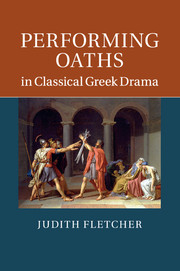Book contents
- Frontmatter
- Contents
- Acknowledgments
- A note on abbreviations
- Introduction
- Chapter 1 From curses to blessings: horkos in the Oresteia
- Chapter 2 Speaking like a man: oaths in Sophocles’ Trachiniae and Philoctetes
- Chapter 3 Horkos in the polis: Athens, Thebes and Sophocles
- Chapter 4 Perjury and other perversions: Euripides’ Phoenissae, Orestes and Cyclops
- Chapter 5 Twisted justice in Aristophanes’ Clouds
- Chapter 6 Women and oaths in Euripides
- Chapter 7 How to do things with Euripides: Aristophanes’ Thesmophoriazusae
- Chapter 8 Swearing off sex: the women's oath in Aristophanes’ Lysistrata
- Conclusion
- Bibliography
- Index locorum
- General index
Chapter 1 - From curses to blessings: horkos in the Oresteia
Published online by Cambridge University Press: 05 December 2011
- Frontmatter
- Contents
- Acknowledgments
- A note on abbreviations
- Introduction
- Chapter 1 From curses to blessings: horkos in the Oresteia
- Chapter 2 Speaking like a man: oaths in Sophocles’ Trachiniae and Philoctetes
- Chapter 3 Horkos in the polis: Athens, Thebes and Sophocles
- Chapter 4 Perjury and other perversions: Euripides’ Phoenissae, Orestes and Cyclops
- Chapter 5 Twisted justice in Aristophanes’ Clouds
- Chapter 6 Women and oaths in Euripides
- Chapter 7 How to do things with Euripides: Aristophanes’ Thesmophoriazusae
- Chapter 8 Swearing off sex: the women's oath in Aristophanes’ Lysistrata
- Conclusion
- Bibliography
- Index locorum
- General index
Summary
The Oresteia virtually throbs with performative speech. Words are the heartbeat of the trilogy, which is quickened from tragic beginning to redemptive conclusion by characters doing things with words. Its men and women pray, supplicate, argue, persuade, curse, bless and perform other speech acts that become part of their world and shape its action. The oracle that Calchas “shrieked out” at Aulis (Ag. 201) convinced Agamemnon to slaughter his daughter. The king then ordered (230–1) his men to lift Iphigenia above the altar for sacrifice. That oracle and ensuing brutal command launch a series of events that leads to further kin slaughter. The events at Aulis, as narrated by the Chorus, illustrate an important principle of speech act theory that is fundamental to this chapter: the productive force of language depends on a context that can activate a social convention, empower the speaker and be accepted by an audience whose reception is essential to the effectiveness of the speech act. In the military encampment at Aulis, Agamemnon has the status to order his daughter's sacrifice so that his underlings understand and obey; his daughter, however, is unable to make effective appeals, and is indeed prevented from speaking out by being gagged (229–39). The girl cannot make language work for her. This dramatic moment, one of the most poignant in tragedy, exemplifies Emile Benveniste's contention that performative utterances are acts of authority “made by those to whom the authority to utter them belongs.”
The term “speech act” covers a range of performative utterances that can include begging, insults, seduction and jokes, each of which requires certain social circumstances and conventions to operate. If a Vestal Virgin were to say, “Let the games begin,” the gladiators would not start killing each other. She does not have the authority to initiate the combat. Some speech acts, jokes for example, have fewer formal parameters; others, like wedding ceremonies, have more rigid requirements. Even the most informal speech act can impel action, but my chief interest in this book lies in ceremonial or ritual language, and especially with words that derive their power from some divine authority. In the Oresteia, like much of tragedy, the speech of gods has the most performative power of all. Athena inaugurates the court of the Areopagus by speaking it into existence; she exculpates Orestes with her word; she appeases the Erinyes with her persuasive speech and transforms them into beneficent fertility spirits by renaming them. Her words give form to human lives and institutions. Accordingly, the performative force of human speech is augmented and magnified by this divine force. As we have just seen, the mantic utterance of Calchas, who interprets the will of the gods, has the power to drive Agamemnon to sacrifice his own child, an act that reverberates throughout the drama.
- Type
- Chapter
- Information
- Performing Oaths in Classical Greek Drama , pp. 35 - 69Publisher: Cambridge University PressPrint publication year: 2011



